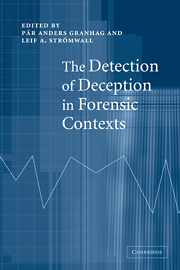Book contents
- Frontmatter
- Contents
- List of figures
- List of tables
- List of contributors
- Part 1 Introduction
- Part 2 Lie-detection techniques
- Part 3 Special issues facing a lie-catcher
- Part 4 Enhancing lie-detection accuracy
- 10 Practitioners' beliefs about deception
- 11 Training to detect deception from behavioural cues: attempts and problems
- 12 The wizards of deception detection
- 13 Guidelines to catch a liar
- Part 5 Conclusions
- Index
- References
12 - The wizards of deception detection
Published online by Cambridge University Press: 22 September 2009
- Frontmatter
- Contents
- List of figures
- List of tables
- List of contributors
- Part 1 Introduction
- Part 2 Lie-detection techniques
- Part 3 Special issues facing a lie-catcher
- Part 4 Enhancing lie-detection accuracy
- 10 Practitioners' beliefs about deception
- 11 Training to detect deception from behavioural cues: attempts and problems
- 12 The wizards of deception detection
- 13 Guidelines to catch a liar
- Part 5 Conclusions
- Index
- References
Summary
Wizard … a sage … a person of amazing skill or accomplishment
For many years we have studied individual differences among people in their ability to detect deception from demeanour. Most people do rather poorly in making such judgements. In experimental situations in which someone is either lying or telling the truth half the time, people do little better than chance (i.e., they get average accuracy scores of 50 per cent). This has been found not only in our studies (Ekman and O'Sullivan, 1991), which examined high-stake lies, but also in a wide range of other studies (Malone and DePaulo, 2001). By doing an idiographic analysis, we have discovered some individuals who are highly accurate across different types of deception. This report describes our beginning research with a small group of such ‘wizards’ of deception detection.
In the late 1980s, we started to administer a test of the ability to detect deception, based on our early work with a group of nurses who had lied or been truthful about their feelings as they watched either a gruesome surgical film or a pleasant nature film (Ekman and Friesen, 1974). When we analysed group performance, we found that most groups – police officers, CIA and FBI agents, lawyers, college students, therapists, judges, etc. – did little better than chance. Yet our objective measurements had demonstrated that there were discernible clues that could have been used to distinguish lying from truthfulness accurately (Ekman, Friesen, O'Sullivan, and Scherer, 1980; Ekman, Friesen, and O'Sullivan, 1988).
Information
- Type
- Chapter
- Information
- The Detection of Deception in Forensic Contexts , pp. 269 - 286Publisher: Cambridge University PressPrint publication year: 2004
References
Accessibility standard: Unknown
Why this information is here
This section outlines the accessibility features of this content - including support for screen readers, full keyboard navigation and high-contrast display options. This may not be relevant for you.Accessibility Information
- 85
- Cited by
